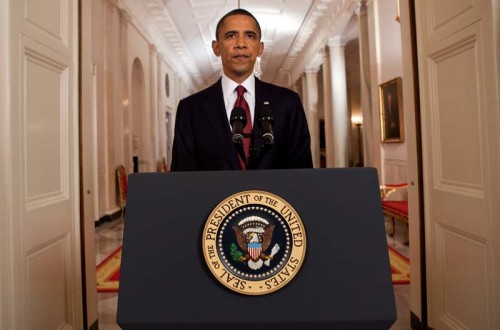
From Robert Bracknell, the New Atlanticist: Killing Osama bin Laden should send a strategic signal to the world of American unity, relentlessness, diligence, and resolve to defeat radicalism, ensure American physical and economic security, and support freedom and democracy the world over. America’s triumphs in this endeavor depend in part on success in the battle of the narrative – coordinated communications on western, progressive values as a competing vision to the repression inherent in radicalism and authoritarianism. The narrative is undermined by disloyal attacks on the President and his team – a President who, in a time of crisis, acted presidential. To be sure, if the covert action he authorized personally had failed, like Desert One in 1980 or the Bay of Pigs in 1961, the responsibility would hang around his neck like an albatross.
After FDR’s “Date of Infamy” speech to a joint session of Congress, the members gave the president a standing ovation, leading Presidential advisor Samuel Irving Rosenman to observe: “It was a most dramatic spectacle there in the chamber of the House of Representatives. On most of the President’s personal appearances before Congress, we found applause coming largely from one side—the Democratic side. But this day was different. The applause, the spirit of cooperation, came equally from both sides…The new feeling of unity which suddenly welled up in the chamber on December 8, the common purpose behind the leadership of the President, the joint determination to see things through, were typical of what was taking place throughout the country.” Unity across the political spectrum in the face of a grave threat: what a novel concept.
Butch Bracknell is a lieutenant colonel in the U.S. Marine Corps. A career military lawyer, he is a Senior Fellow at the Atlantic Council. Small Wars Journal also published this essay.
Image: BARACK-OBAMA-e1304445532275.jpg
